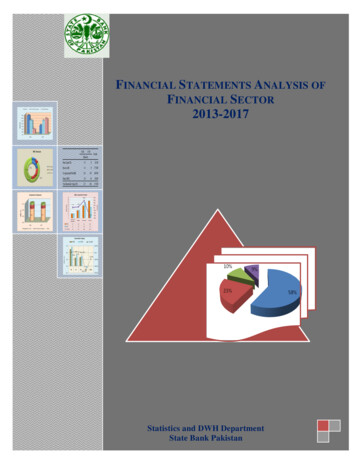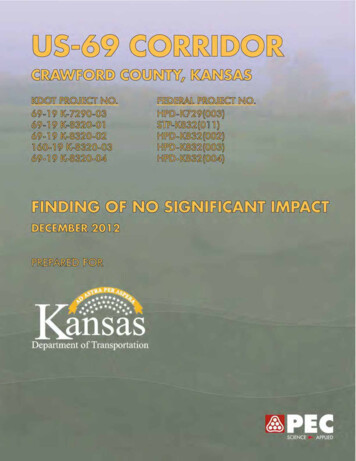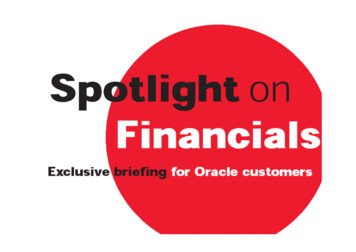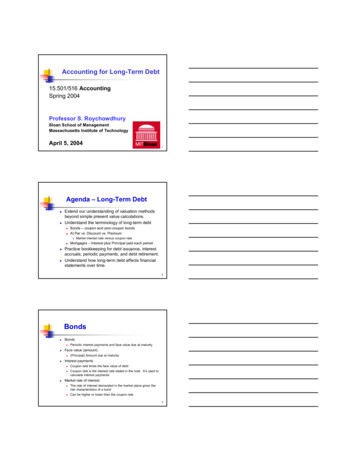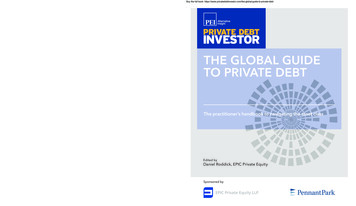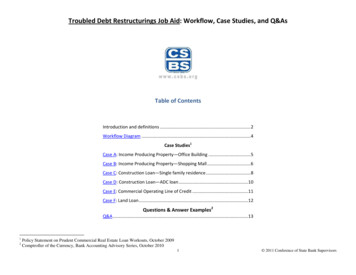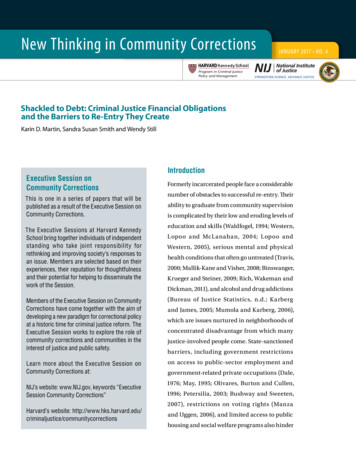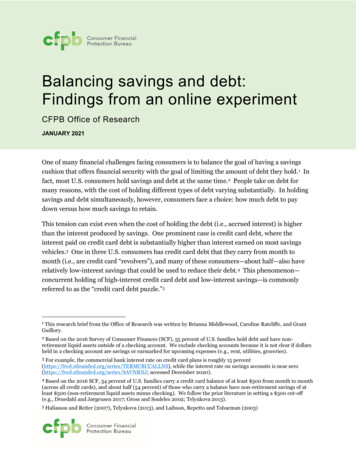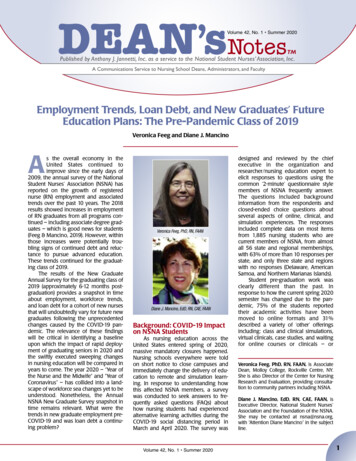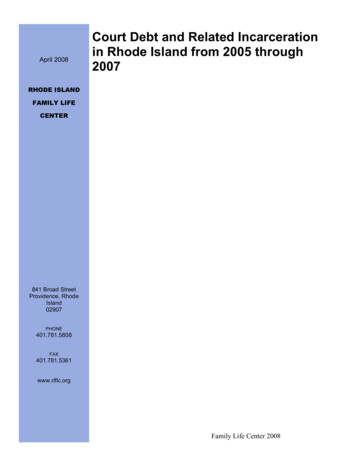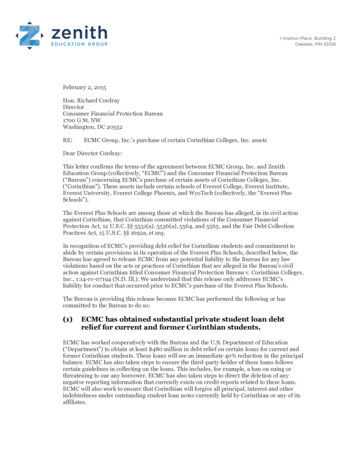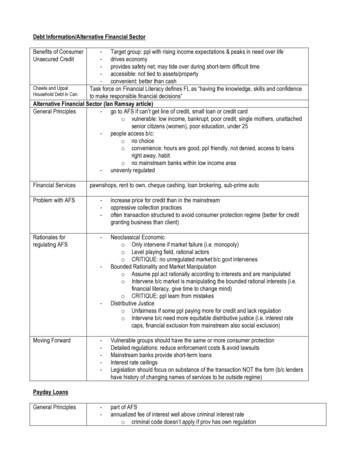
Transcription
Debt Information/Alternative Financial SectorBenefits of ConsumerUnsecured Credit- Target group: ppl with rising income expectations & peaks in need over life- drives economy- provides safety net, may tide over during short-term difficult time- accessible: not tied to assets/property- convenient: better than cashChawla and UppalTask force on Financial Literacy defines FL as “having the knowledge, skills and confidenceHousehold Debt in Can.to make responsible financial decisions”Alternative Financial Sector (Ian Ramsay article)General Principles- go to AFS if can’t get line of credit, small loan or credit cardo vulnerable: low income, bankrupt, poor credit, single mothers, unattachedsenior citizens (women), poor education, under 25- people access b/c:o no choiceo convenience: hours are good, ppl friendly, not denied, access to loansright away, habito no mainstream banks within low income area- unevenly regulatedFinancial Servicespawnshops, rent to own, cheque cashing, loan brokering, sub-prime autoProblem with AFS-increase price for credit than in the mainstreamoppressive collection practicesoften transaction structured to avoid consumer protection regime (better for creditgranting business than client)Rationales forregulating AFS-Neoclassical Economico Only intervene if market failure (i.e. monopoly)o Level playing field, rational actorso CRITIQUE: no unregulated market b/c govt intervenesBounded Rationality and Market Manipulationo Assume ppl act rationally according to interests and are manipulatedo Intervene b/c market is manipulating the bounded rational interests (i.e.financial literacy, give time to change mind)o CRITIQUE: ppl learn from mistakesDistributive Justiceo Unfairness if some ppl paying more for credit and lack regulationo Intervene b/c need more equitable distributive justice (i.e. interest ratecaps, financial exclusion from mainstream also social exclusion)--Moving Forward-Vulnerable groups should have the same or more consumer protectionDetailed regulations: reduce enforcement costs & avoid lawsuitsMainstream banks provide short-term loansInterest rate ceilingsLegislation should focus on substance of the transaction NOT the form (b/c lendershave history of changing names of services to be outside regime)-part of AFSannualized fee of interest well above criminal interest rateo criminal code doesn’t apply if prov has own regulationPayday LoansGeneral Principles
--Criminal Codeloans range from 100- 1000Consumer movement asking for regulation (currently regulate criminal interest rate)o Interest rate capso Rollover regulations (roll over debt with higher interest in fees)o More transparency about full costso Common proposals: license payday lenders, interest caps, prohibit rollovers,introduce cooling off periods (sign up and change mind w/ no fee)Payday lenders want regulationo b/c want to legitimize business and stop class actionso say most clients are occasional users not regular shortfallso meeting a need b/c too risky for mainstream so need higher interest rateS347 – definitions; doesn’t apply to payday loans less than 1500 and 62 day term or less, theperson is licensedS347.1 – payday loans tries to capture substance rather than name; (3) feds allow for provinces tocreate legislation to protect consumers and introduce caps so criminal interest rate doesn’t applyBPCPS112.01 – defn payday loan112.02 – LG in Council may regulate total cost of credit for payday loans and any interest/charges(can’t charge more than criminal interest BUT can charge more than cabinet)112.03 – lenders cant charge for a period that exceeds number in s197.1(1) if borrower fails to makelast payment112.04 – prohibited fees/penalties/charges112.05 – cancelling (“cooling off” period) payday loans112.06 – loan agreement requirements112.08 – prohibited practices (what lender can’t do!): no rollovers, no new loans to borrower whoalready has loan with that lender, etc.s165 – remedies for contraventionPayday LoanRegulationsConsumer protection BC licenses and ensures compliance with the regulationsS17 – max loan 23% of principal, (2) max rate 30% per annum on default (but in two week periodcan charge 23% which is annualized to 600%); (2) max of 25 dishonoured chequeS18 – can’t lend 50% net pay/income that will be received during pay periodS23 – have to have longer payback period depending on how paid; i.e. 3rd agreement in 62 daysneed to have longer loan period; repayment of loan distributed equally over loan periodCompliance Order andAdmin Penalty (CashStore) March 23 20123 violations of actcharging fee to get money on cash card (contrary s112.04)charging more than 23% interest on cash card (contrary s17)had to pay immediately to get card and no other option (contrary s19)SupplementalCompliance Order(Cash Store) November30 2012HELD: refund issuants fees, admin penalty 25,000, pay costs 21,000Very detailed order about how to go about issuing the refunds for fees that they are required to give underMarch 23 2012 order
Credit Reporting and Credit Card RegulationIf information oncredit report iswrong, what stepscan you take?1. figure out where the error is – what specific provision (given to wrong person unders108, contain wrong information under s109, no notice under s110)2. IF Credit Reporting Agency made a mistake:a. S111 BPCP: individual can give explanation of info to reporting agencyb. S24 PIPA: (1) can request error or omission in report about individualunder control of organization be corrected; (2) if RG organization mustcorrect info as soon as reasonably possible and send corrected info to allorganizations where incorrect report sentc. S27 PIPA: individual must send written request for correction withsufficient detail for organization to make correctiond. S171(1)(b) BPCP: bring action against reporting agency for damagessuffered (but no punitive damages) (& can’t bring if given compensationfrom same under 192 for an offence under the act)e. Haskett v Equifax: b/c of negligence can sue for damages; credit isintegral and consumers should be able to rely on credit reporting agenciesto get it right – reporting agencies owe DOC to person report is about3. What if person (i.e. bank) who receives information makes a mistake (i.e. no noticeunder s110(2) for why denied credit)?a. Sue bank for damages b/c of negligenceBusiness Practices andConsumer ProtectionActCREDIT REPORTINGREQUIREMENTS!S106: definitionsS107: must have consent of individual to whom credit report relatesS108: lists who credit reports can be given to (lender, landlord, employer, insurance provider, lawfulpurpose, business requirement, govt, police, court order, BPCP director, individual to whom creditreport relates)S109: (f) judgment info more than 6 years old can’t be in report unless still outstanding; (g) bankruptcant be in report after 6 years of discharge UNLESS more than once; (o) catch all – nothing 6 yearsafter eventS110: (1) if person who receives credit report denies all or part of a benefit OR increases the cost of abenefit b/c of credit report MUST (2) give written notice no later than 30 days after decision made inperson or by mailS111: individual can give explanation of info relating to credit report to reporting agencyS112: cannot give false or misleading info to reporting agencyPersonal InformationProtection ActCredit Cards and Linesof CreditS171(1)(b): if suffered damages or loss b/c of contravention of act/regulations can bring action againstreporting agency BUT can’t bring action under 171 if court already issued compensation to consumersunder 192S12: allows reporting agency to collect info for future credit report without consent as long asindividual consents to giving information the first timeS24: right to request correction of personal informationS27: procedure for how to make requestBPCP s99: no liable for charges if lost or stolen UNLESS they know your pin and take money fromATM (not good for elderly, written when most ppl signing – out of date legislation)Credit Business Practices Regulationss3 (2) grace period, (4) can’t charge interest on or before due date if paid billss4 cash advance on credit card higher interest rate than if regular purchase (higher interestrate only for cash advance, pay proportionately)s6: need your permission to raise limit
Debt Collections PracticesWhat do you do ifdebtor and youthink debtcollection iswrong?1. Figure out if there is a violation – what is the specific sectiona. Are there any other potential violations that need more info for?b. Common Violations of Collection Agencies/Creditors in BPCP:i. S114 – Harassment1. includes: threatening language, undue/excessivepressure, threatening to publish debts, etc.2. Total Credit v Roach: even if technically complies withact (one cease and desist letter) can go against spirit ofthe act; one bad call not harassment BUT calls andinteraction and log notes create attitude of harassment –very bad that called at work with purpose of notconfirming employment, saying urgent when not urgentis wrong, tried to collect more than due – not enoughevidence on loss of reputation claimii. S115 – did not make reasonable attempt to notify in writing, didnot wait 5 days before calling1. Doesn’t apply to creditor collecting debt (DIC Reg)iii. S116 – made more than one attempt at work and/or conditions tomeet before calling at work not met (attempt at home, consentfrom individual), did not communicate in writing only once asked1. 116(4)(c) doesn’t apply to govt (DIC Reg 2(4))iv. S117 – communicated with ppl other than debtorv. S118 – called at wrong time (stat holiday, Sunday outside 1-5pm, weekday outside 7 am – 9 pm)vi. S120 – collected more than owing, collect from ppl not liable,continue communication if claim not to be debtorvii. S121 – legal proceedings w/o notice1. Doesn’t apply to creditor collecting debt (DIC Reg)viii. Did they have a license? (required under s143 BPCP)1. Canaccede: if no license, collection agency has toregister for one BUT debtor still has to pay debt – forsanctions against collection agency need to go toConsumer Protection BC2. How to remedy problem?a. Immediate Action: Send a Letter!i. S116(4)(b) BPCP: communicate to lawyer by writing only OR withdebtor by writing onlyb. File Complaint to Consumer Protection BCi. Might recover some damagesc. Sue for Damagesi. S171 BPCP – if suffered loss or damage by contravention of actcan bring an action against (c) collector, (d) sheriff, collectionagent, debt poolerHow do you collectdebt as originalcreditor?1. Immediate Action: Send Demand Letter if trying to collecta. LSBC CPC 7.2-6 (subject to 7.2-7): if other side has a lawyer needconsent of lawyer before approaching, communicating, negotiating etc.with their clientb. LSBC CPC 3.2-5: can’t threaten or advise to threaten to make quasicriminal charge or regulatory complaint to get debt paidc. Might not want to send demand letter if risk debtor will leave or send
BPCPMore potentialviolations of the act!assets out of country (creditor lawyer and original creditor exempt froms115 and s121 per s2 DCI Regs)2. Following actions: make calls BUT don’t violate act, try to informally get debt paid3. Send debt to collection agency for collection4. Start proceedings to get judgment, garnish wages, execute against land/pers. propa. Don’t need to give notice under s121 BPCP b/c 2(2) DIC RegsProhibited Collection Practices113 – broad definition of “collector”: person (in BC or not) collecting or attempting to collect debt114 – Harassment (non-exhaustive list)- (1) can’t contact family, employer etc in harassing manner- (2) includes: threatening/profane language, undue/excessive pressure, threateningto publish debts, etc.- Total Credit Recovery v Roach: discusses harassment, sometimes complyingwith act still goes against spirit [can’t say urgent when not urgent!]115 - Disclosure to debtor- before can call need to make reasonable attempt to notify in writing (name ofcreditor, amount and authority of collector) VIOLATED in Canaccede- (2) once letter is sent have to wait 5 days before can call- * b/c DIC Regulation 2(2) doesn’t apply to creditor collecting debt116 – communication to debtor- (2) can only make one attempt to call at work (AND only if don’t have homeaddress/telephone OR attempts at home not working OR debtor says ok)- (4) have to communicate in writing only if debtor notifies collector to communicate inwriting only and gives addresso * b/c DIC Regulation 2(4) doesn’t apply to govt117 – cant communicate with people other than debtor- (2) exception: can communicate w/ employer to confirm D’s employment or ifauthorized by D118 – time of communication restricted to particular times/days119 - can’t make collect calls120 – can’t collect from person not liable for debt or in excess of amount of debt or continuecommunication if person claims not to be debtor121 – prohibits collection agency from starting legal proceedings w/o giving notice- * b/c DIC Regulation 2(2) doesn’t apply to creditor collecting debt122 – (a) collector can’t remove, seize, repossess or levy distress from inside home inabsence of (or their agent), (b) can’t take things don’t have an order for, (c) can’ttake during prohibited time123 – collector can’t use false or misleading information and misrepresentation to attempt tocollect payment – (1) can’t supply false or misleading info, (b) can’t misrepresentpurpose of communication, (c) can’t misrepresent identity of collector, (d) can’t usecourt-like documents that imply connection with court if not lawfulDebt CollectionIndustry Regulation2(2) – s115 and 121 don’t apply to original creditor2(4) – s116(4) doesn’t apply to govtLaw Society of BC,Code of ProfessionalConductCredit BusinessPractices Regulations7.2-6 (subject to 7.2-7) – if person has a lawyer need consent of lawyer before approaching,communicating, negotiating etc. with client3.2- 5 – lawyer can’t threaten quasi-criminal charges or regulatory complaints or advise client to do so7(11) – co
s115 and s121 per s2 DCI Regs) 2. Following actions: make calls BUT don’t violate act, try to informally get debt paid 3. Send debt to collection agency for collection 4. Start proceedings to get judgment, garnish wages, execute against land/pers. prop a. Don’t need to give notice under s121 BPCP b/c 2(2) DIC Regs Prohibited Collection .
